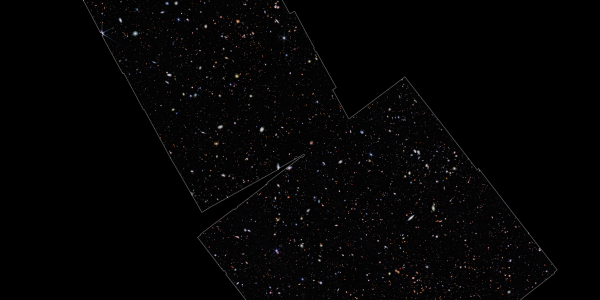St. Louis Astronomical Society Meeting: Pushing the Redshift Frontier with JWST
Professor Haojing Yan will be featured at the February meeting of the Saint Louis Astronomical Society. The meeting will be in McDonnell Hall, Room 162, Washington University in St. Louis, and via Zoom.
Within merely a month after it began its official operation, the James Webb Space Telescope (JWST) has changed the landscape of the study of the early universe. The most exciting result is the discovery of candidate galaxies at redshifts beyond 11. Some of these could be at redshifts larger than 20, which was ~200 million years after the Big Bang. It is extremely surprising, however, that there are so many such candidates and that they are so bright. Yan will be giving an overview of the latest development on this frontier and our path forward.
Professor Yan is an observational astronomer who has a broad interest in galaxy formation and evolution, and is an active user of a variety of ground-based and space-based telescopes and their archives. Currently his interests largely focus on three subjects: (1) searching for and understanding galaxies in the early universe when it was only less than ~ 1 billion years after the Big Bang (or in other words, ~ 13 billion years ago), (2) investigating the mass assembly history of galaxies over cosmic time, and (3) understanding the dust-embedded star formation processes in galaxies near and far. He is part of the Webb Medium-Deep Survey (WMDF), a JWST GTO program. In the past, he led "Hubble Infrared Pure Parallel Imaging Extragalactic Survey” (HIPPIES), which used the data obtained by the Hubble Space Telescope. He was also deeply involved in a number of other space-based survey programs, such as the “Great Observatories Origins Deep Survey” (GOODS) and the “Spitzer Extended Deep Survey” (SEDS), and most recently the “Cosmic Assembly Near-infrared Deep Extragalactic Legacy Survey” (CANDELS).
The St. Louis Astronomical Society is an organization for individuals interested in astronomy and telescopes. The public is invited to attend its meetings, telescope observing sessions, and special events. For more information about Astronomical Society events, please visit www.slasonline.org or call 314-962-9231. The event, cosponsored by NASA's Missouri Space Grant Consortium at Washington University, is open to the public free of charge.
McDonnell Hall is on the south side of the Danforth Campus, One Brookings Drive, St. Louis 63130. The closest parking is street parking on Forsyth Boulevard or the East End Garage. Parking is free for entry after 5:00 pm in yellow or visitor parking spaces only. If you prefer to attend virtually, non-members of SLAS may request the Zoom link here:

